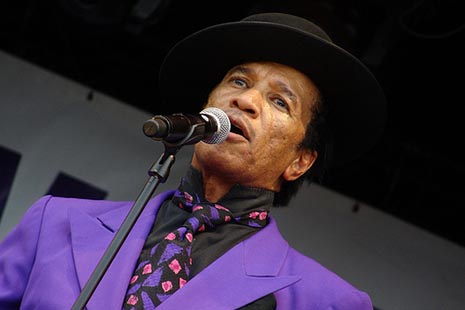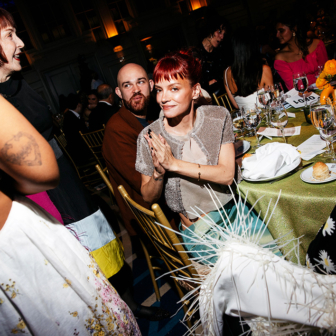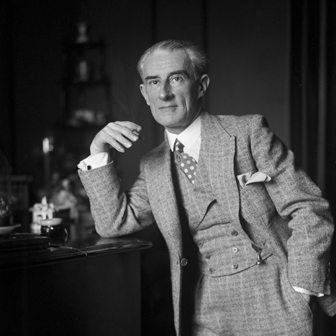THE news that Kid Creole and the Coconuts had a new album out filled me with disproportionate (and, as it turns out, short-lived) delight. These were the purveyors of some of the best pure pop of the early 1980s, years by no means short on first-rate pop. With its heady mix of influences, Kid Creole’s music had an appeal transcending genres, cultures and eras.
The basic recipe blended 1940s big-band swing (complete with Andrews Sisters–style backing vocals from the Coconuts) with a variety of Caribbean musical types and sounds, including a strong dose of Calypso and the occasional appearance of steel drums. There were Latin American dance rhythms, a dynamic horn section and a hint of South African Township jive in the fast, syncopated rhythm guitar: all this on top of a thumping disco beat. Out in front was the Kid himself, posturing like Cab Calloway pretending to be a sophisticated Caribbean gangster.
“I’m a Wonderful Thing, Baby,” “Stool Pigeon” and “Annie, I’m Not Your Daddy” sound as sassy, imaginative and full of energy today as they did in 1982. I keep my greatest hits CD in the car, though listening to it can make one exceed the speed limit. Alas, the new album is more dangerous still in terms of driving, for it’s likely to put you to sleep. Maybe this was behind the decision to call it I Wake Up Screaming.
The persona of Kid Creole was not the first time August Darnell had reinvented himself. His real name is Thomas August Darnell Browder, and he was born sixty-one years ago in the Bronx. Whatever the reasons for the dropping of his outer names, Tom Browder’s middle names already made him sound a lot like the Caribbean gangster he would come to impersonate. The early 1980s was the era of pop-star dress-up, as punk gave way to the dishevelled glamour of the new romantics, but there was none more stylish than Darnell dressed as the Kid. From top to bottom, his was a class act. Unfortunately the new album is just a pale imitation of what we already had on those greatest hits discs. The songs are still about elegant underworld figures and they employ all the old musical moves, but the Kid’s voice sounds tired and, to be honest, so do the arrangements. Too bad Darnell wasn’t able to keep reinventing himself.
When The Who’s Roger Daltrey sang “Hope I die before I get old” in “My Generation,” he was on to something. Back in 1965, I suppose, no one really expected that pop musicians would get old or that, if they didn’t die, they might continue to perform and make records well past pensionable age. But now there are musicians in their sixties and seventies reforming their bands, trotting out the old hits and even writing new songs. There are also those, like Bob Dylan, who simply kept going. In an ironic little twist, Daltrey himself is one of the two original members of The Who still alive.
How much do we care? I was briefly excited at the prospect of a new Kid Creole album because I still love the band’s music from thirty years ago, but what was I really expecting? That the new recording would sound the same? What would be the point of that? That it would be a radical departure? Ditto. That’s the bind in which ageing pop musicians find themselves. If they turn up to a concert and do the old stuff it won’t sound as good as it used to, and yet the fans, who are probably the same age as the artists, have only a limited tolerance for new songs. They’re fans because of the old stuff.
There are exceptions. Leonard Cohen’s old songs actually fit his seventy-seven-year-old self better than they did the young man who wrote them. No need for reinvention there, and anyway seeing him on stage enjoying himself is such a novelty. Dylan on the other hand has never stopped performing and never stopped reworking his songs. If you go to a Dylan concert, it might take you a verse and a chorus before you realise you’re listening to “The Times They Are A-Changin’,” because the tune keeps a-changin’ too. And these days Dylan’s voice is in such a state of disrepair that one probably wouldn’t recognise his singing of the original tune. Yet every other new album still contains songs that are worth hearing and worth getting to know. Paul Simon, likewise, with the added bonus that Simon’s seventy-year-old voice is unaccountably unchanged from the one that duetted with Art Garfunkel in the mid 1960s.
But suddenly we’re talking about something like art, and Kid Creole was only ever pop. There’s nothing wrong with that, of course; it’s just that pop is of its time. After that, if it was good, it becomes nostalgia. Three decades ago Kid Creole had half a dozen bona fide hits, and if that’s not good enough for him it’s good enough for me. •




